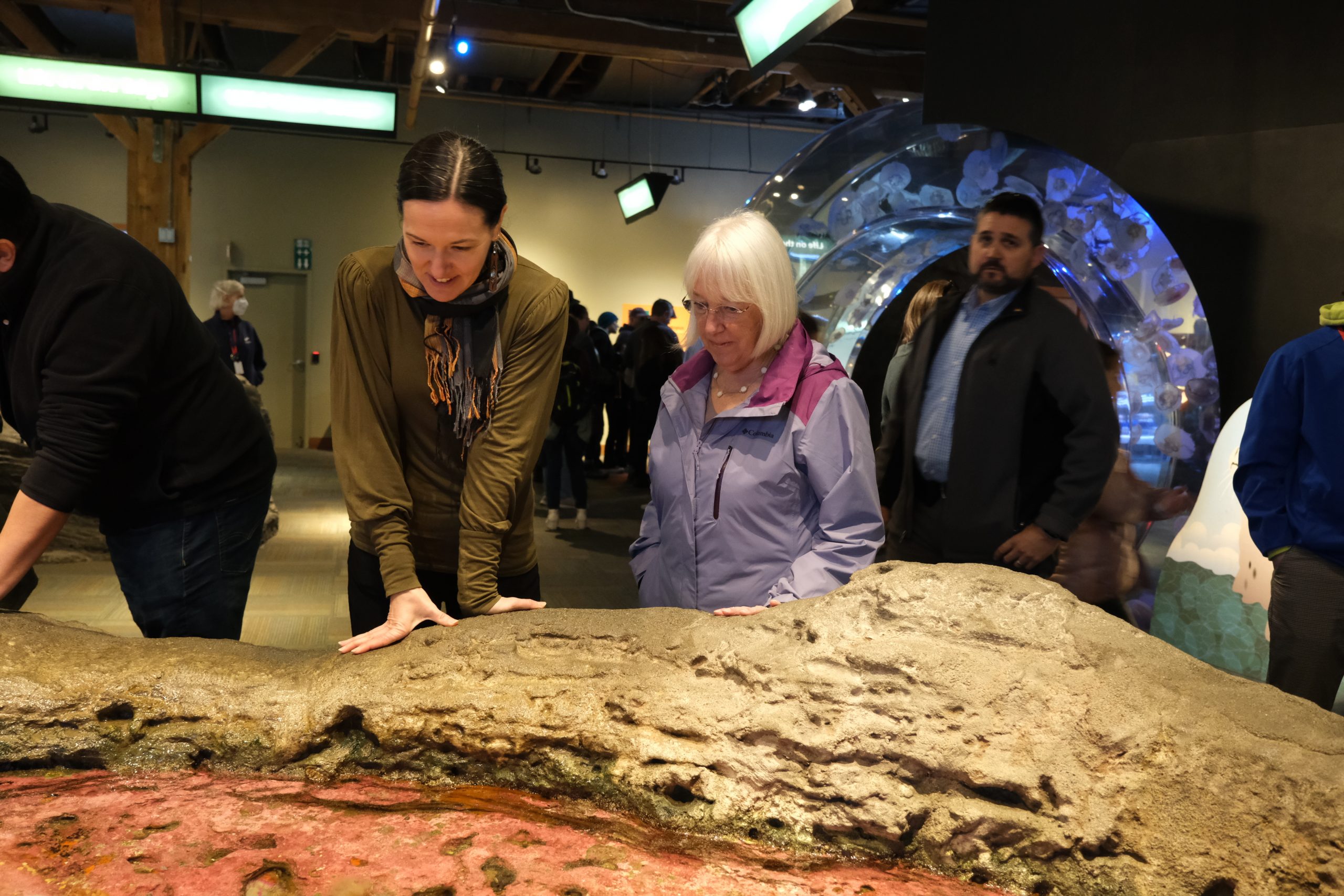Senador Murray: “We owe it to our kids to leave them a Sound that’s clean and protected—where salmon and orca are thriving—and that’s why I’ve been so focused on making sure Congress delivers much-needed resources to protect and restore the Sound.”
***PHOTOS AND VIDEO OF THE EVENT AQUÍ ***
(Seattle, WA) – Today, U.S. Senator Patty Murray (D-WA), Chair of the Senate Appropriations Committee, hosted a roundtable at the Seattle Aquarium to discuss her ongoing work to protect and restore the Puget Sound for generations to come—including by delivering funding for restoration and conservation efforts in last year’s spending package, the Ley de infraestructura bipartidista, y el Ley de Reducción de la Inflación.
Senator Murray was joined by Laura Blackmore, Executive Director of Puget Sound Partnership; Casey Sixkiller, Regional Administrator of the Environmental Protection Agency’s (EPA) Region X; Justin Parker of the Northwest Indian Fisheries Commission; Dr. Erin Meyer, Director of Conservation Programs & Partnerships at Seattle Aquarium; Felicia Wibowo, a local sea kayaker; George Gronseth, owner of Kayak Academy; Bill Dewey, Director of Public Affairs at Taylor Shellfish Farms; and Willie Frank III, the Chairman of the Nisqually Tribe.
“The Puget Sound is one of Washington state’s greatest treasures: it’s absolutely central to our state’s economy, environment, culture, and Tribal treaty rights—and it’s critical we restore and protect it for generations to come. We owe it to our kids to leave them a Sound that’s clean and protected—where salmon and orca are thriving—and that’s why I’ve been so focused on making sure Congress delivers much-needed resources to protect and restore the Sound,” dijo el senador Murray. "I was proud to secure truly historic new investments in the Sound last Congress, and now I’m watching closely to make sure these federal dollars are being put to good use—and as Congress intended—just as I keep fighting to build on this progress in the other Washington.”
“With passage of the PUGET SOS act, the Bipartisan Infrastructure law, the Inflation Reduction act, and increases in the EPA geographic program, we have the opportunity for transformative change across the region.” said Laura Blackmore, Executive Director of the Puget Sound Partnership. “With these federal investments, we hope to supercharge our efforts to protect and restore habitat for our salmon, orcas, and other wildlife species, clean up the water, uphold tribal treaty rights, and cool our rivers and streams. We are deeply grateful for Senator Murray’s continued leadership in championing these Puget Sound priorities.”
“This is both an historic and a particularly critical time for our efforts to protect Puget Sound,” said Casey Sixkiller, Regional Administrator of EPA’s Region 10 office in Seattle. “The funding Senator Murray has secured will help accelerate protection and restoration projects while also supporting our efforts to ensure these projects equitably serve the needs of the diverse communities around the Sound.”
“Restoring Puget Sound is a long term commitment,” said Bill Dewey, Director of Public Affairs at Taylor Shellfish Farms. “The Senator’s unwavering support to accomplish it, including this substantial new investment will ensure the Sound continues its reputation for producing world class shellfish.”
In last year’s spending bill, Senator Murray secured $54 millones, the largest ever annual investment, for the Puget Sound Geographic Program. As Senate Appropriations Chair, Senator Murray will be fighting to protect and build on that funding in future spending bills. In that same spending bill, Senator Murray also personally secured $6 million for the Army Corps’ Puget Sound Nearshore Marine Habitat restoration project and $1.5 million for the University of Washington to upgrade water monitoring systems in the Sound—both as a part of the overall $284 million Senator Murray secured in Congressionally-Directed Spending for local projects throughout Washington state.
Through the Ley de Infraestructura Bipartidista, Senator Murray also helped secure $89 million over 5 years for the Puget Sound Geographic Program. El Ley de infraestructura bipartidista also included a number of provisions that would benefit salmon and ecosystem restoration, including $172 million for the National Oceanic and Atmospheric Administration’s (NOAA) Pacific Coastal Salmon Recovery Fund (PCSRF), a grant program that provides funding to states and Tribes to protect, conserve, and restore endangered and threatened salmon populations—overall the Bipartisan Infrastructure Law delivers nearly $3 billion in funding opportunities for coastal infrastructure and climate change resilience.
Senator Murray has made clear that Congress must take bold climate action, and was instrumental in passing the Ley de Reducción de la Inflación which delivers the largest investment in combating the climate crisis in American history. The Ley de Reducción de la Inflación provides a total of $3.3 billion for NOAA—including $2.6 billion to support NOAA’s climate, habitat restoration, and fisheries missions; $200 million for NOAA Facilities and National Marine Sanctuaries; and $20 million for more efficient NOAA environmental reviews.
Senator Murray also passed the Ley de Puget Save Our Sound (Puget SOS Act) as part of the Water Resources Development Act of 2022. The bill establishes a Puget Sound Recovery National Program Office within the Environmental Protection Agency and in coordination with NOAA and other federal agencies. The Puget SOS Act would also codify the Puget Sound Federal Leadership Task Force, which is made up of federal agencies that play a vital role in protecting Puget Sound. Funding the Puget Sound Recovery National Program Office will be a top priority for Senator Murray.
At the start of the event, Senator Murray also announced $354,608 in EPA funding for the Seattle Aquarium Society Bull Kelp Conservation and Restoration in Puget Sound.Kelp is the predominant habitat-forming species in temperate coastal ecosystems, it helps carry out critical ecological functions that support other species, it grows rapidly and has the potential to sequester large amounts of carbon, and it provides ecosystem services essential to human well-being. Puget Sound has experienced marked kelp declines in recent decades, with an overall 65% loss since 1980, and some areas exhibiting a 96% decline.
###


